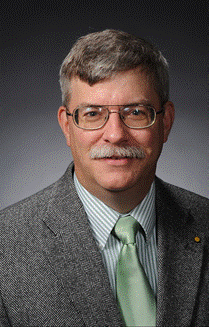 Gordon Miller, winner of the 2013 ACS Midwests Award, is University Professor of Chemistry at Iowa State University. Niller received his BS summa cum laude in 1982 from the University of Rochester, where he worked under the direction of Richard Eisenberg. In 1986, he received his PhD degree from the University of Chicago, where he worked with Jeremy Burdett. Gordie gained post-doctoral experience with Arndt Simon at the Max-Planck-Institute für Festkörperforschung in Stuttgart, Germany. Gordie began his independent career in 1990 at Iowa State University, where he has distinguished himself as an outstanding teacher, mentor, and departmental chair. He also is a member and project leader at Ames Laboratory.
Gordon Miller, winner of the 2013 ACS Midwests Award, is University Professor of Chemistry at Iowa State University. Niller received his BS summa cum laude in 1982 from the University of Rochester, where he worked under the direction of Richard Eisenberg. In 1986, he received his PhD degree from the University of Chicago, where he worked with Jeremy Burdett. Gordie gained post-doctoral experience with Arndt Simon at the Max-Planck-Institute für Festkörperforschung in Stuttgart, Germany. Gordie began his independent career in 1990 at Iowa State University, where he has distinguished himself as an outstanding teacher, mentor, and departmental chair. He also is a member and project leader at Ames Laboratory.
Professor Miller has established one of the preeminent research groups in the areas of theoretical and experimental solid-state inorganic chemistry, gaining an exceptionally broad understanding of the basis of structure-composition-property relationships among metal-rich compounds. This class of compounds offers tremendous technological potential for energy storage and conversion, catalysis, and magnetoresponsive applications, but even their basic chemistries are known in only a few systems and regions. Miller’s goal is to understand the relationships among chemical composition, atomic structure, physical properties, and chemical bonding so as to establish a set of chemical “rules of thumb” that may predict relative stabilities, structures, and properties over a major part of the periodic table. Overall, Professor Miller has published over 167 peer-reviewed research articles and has given more than 116 invited lectures at various national and international institutions, meetings and symposia since he has been at Iowa State.
In supporting the nomination of Professor Miller, Nobel laureate Roald Hoffman writes,
Gordie Miller is simply the best solid-state chemist we have working on intermetallics. His blend of good theory, chemically motivated, and of meticulous and ingenious synthesis, and of structural and magnetic studies, is unmatched in our profession. He makes interesting substances and thinks about them, deeply so.
Miller has mentored 62 postdoctoral, graduate and undergraduate students. Among his post-doc and PhD students, many have gone on to faculty positions at institutions across North America. He regularly encourages undergraduate students into research activities during their first and second years; many of those he has mentored have gone on to graduate studies in chemistry and careers in the sciences. Miller works consistently and effectively to improve the academic environment and scholarly activities of students at both the undergraduate and graduate levels. Gordie is also well known for his pedagogical talents in lectures, including annual turns in general chemistry courses; he has received two awards for his teaching from the College of Liberal Arts and Sciences.


